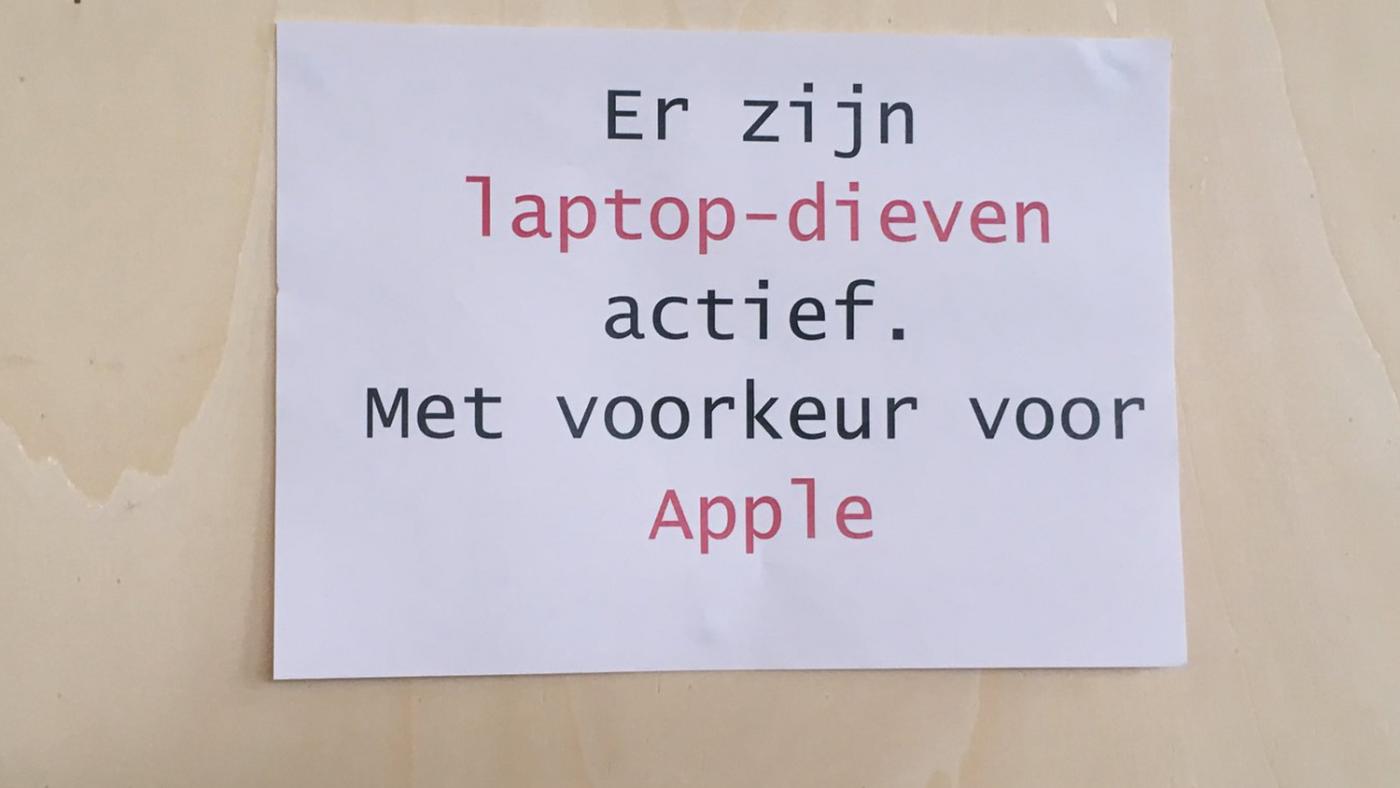Don’t leave your laptop unattended at the UU

In the past two months, five or six students have become the victim of laptop thieves in several university buildings at De Uithof. The thieves are mostly after MacBooks. It’s a peak moment, says department head Security Joost Petrusma, who suspects not all thefts are reported.
In the city centre, things don’t seem to be quite as bad: the last report happened in April, when a laptop was stolen in the University Library at the Drift. The university’s Facilities Service Centre has asked its employees to be extra alert. In the Ruppert building and the Educatorium at De Uithof, memos are posted to warn students for thieves.
Own responsibility
When asking around, it becomes clear that many students haven’t even seen the warnings, but that doesn’t mean these students would leave their belongings unattended at the university. “I think your laptop is your own responsibility. I take it with me everywhere, unless there’s someone I know who’s willing to keep an eye out,” Dyon says. Silke agrees that students’ belongings aren’t the university’s responsibility. “It’s not as if it’s such a great effort to close your laptop. If you know the danger’s there, you can take it into consideration, can’t you?”
Silke thinks the university could help by implementing preventive measures. “Perhaps it could help to have people feel as if they’re being watched, for instance because they have to enter through a system. If you know you’re being watched, you wouldn’t take someone else’s laptop quite as easily. You can track the perpetrator with camera footage after a theft, but by then it’s really too late.”
Grabbing lunch
“I think I was gone for less than thirty minutes. I came back and everything was there, except my laptop. They even left my charger.” Eline didn’t think people with bad intentions would walk into the university, but that trust was definitely broken. Together with a classmate, she’d been studying in a study booth in the Koningsberger building at De Uithof. When they went out to lunch, they left their belongings in the booth. When they returned, it became clear Eline’s MacBook had been stolen. Her classmate’s laptop – not an Apple – was still there.
Eline: “The first thing I did was check three times whether I hadn’t just put it in my bag and forgot about it. Then, I went to the reception desk and they called the university’s incident room. That’s all they could do, really. I reported the crime to the police, but they couldn’t do much either, because I didn’t have a description of the thief. There aren’t any cameras in the part of the Koningsberger building where my laptop was stolen.”
Although Eline’s bummed about her stolen laptop, she doesn’t think the university should introduce extreme measures. A card system, for instance, would be an inconvenience more than anything. “All you need to do is inform people not to leave their belongings unattended. A short note would suffice. Then at least you’re aware your surroundings aren’t as safe as you thought they were.”
Hospitable alertness
The university’s security is thinking bigger things than simply spreading warning notes to prevent theft. They’re working hard on new measures. “We’re trying to work towards a more proactive security, in which we train our staff in hospitable alertness,” says department head Joost Petrusma. “That means we’ll handle according to the motto You see something, you say something: if a staff member sees suspicious behaviour in a visitor, he’ll start a conversation with them, with questions such as: ‘Can I help you?’ or ‘What brings you here today?’. Potential thieves will feel seen that way, and they’ll be less likely to steal.”
What measures are in place now to prevent laptop thefts? Petrusma: “We have the so-called mobile surveillance, security staff who walk rounds in several buildings, and conduct fire and closure rounds. We also have surveillance staff who walk rounds in any given building. In so-called critical spaces (spaces with a higher risk of theft, such as a storage room for chemicals, ed.), there are access systems in place on the doors.
There are also 350 cameras spread throughout the university buildings, but when we get the report of a theft, the criminal will already have left. We’ll assess the damage or contact the police. Sometimes, the police can use the camera footage to find out whether the perpetrator’s a known criminal.”
It remains important, however, to increase awareness of security amongst students and employees, says Petrusma, because prevention is of course better than action after the fact. If you’re the victim of a laptop thief, Petrusma advises to contact the reception desk or a surveillance staff member as quickly as possible. “If there aren’t any, you can always call the incident room at 030-2531300. The dispatcher will then send a Security employee, but the victim will always have to report the crime with the police themselves.”
Translation: Indra Spronk